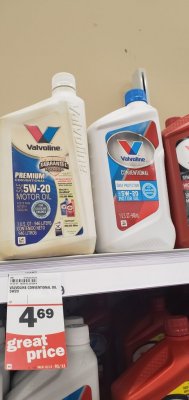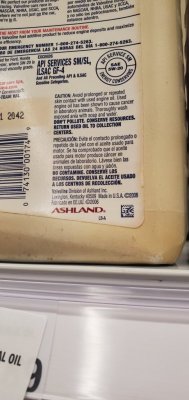Yep, pure synthetic motor oil is extra money and overkill (but overkill always works) in most engines. What is really expensive, though, is changing the engine oil long before it needs changing.
All my 4-stroke engines, even the lawn mowers, specify 10W-30 and 10W-30 is 10W-30 no matter how or by whom it's made. The Subaru 3.6R is now the biggest engine in our garage since the 3.5 EB V6 replaced the 5.4 V8, and is the only engine of ours that specifies pure synthetic. Oil change requirement is cut in half with conventional oil.
The only reason I run pure synthetic in my lawn mowers is it's on hand. My Honda S2000 roadster is now 13 years old and if pure synthetic offers any benefit, even trivial, it gets it. Five quarts of 5W-30 only because Royal Purple doesn't have a 0W-30. I change that oil at home and what's left over goes in the mowers. But the additional expense is about that of a lunch at Five Guys and I can skip one of these every year. Call it two as the Expedition gets serviced annually at the dealer and pure synthetic goes in the engine there too.
Most engine oil discussions seem to be emotional.

The Amsoil disciples stop just short of claiming it cures cancer.
-- Chuck
True, and most of us do whatever makes us feel good but we should admit that that's why we do it. Because it makes us feel good. Nobody out there has had an engine only lasts a hundred twenty five thousand because they didn't use synthetic oil. And people out there that have engines that last 300,000 that run synthetic, it's not because they ran synthetic. Plenty of other real world evidence with people using standard oils getting the same results. As you mentioned it's more about the oil change interval that it is the type of oil you use. Synthetics will allow you to go longer between changes and up with the same result of wear and protection. So you can spend a little bit more money and not changing his often and probably break even or maybe even save a little bit in the long run.
Is all of your lawn mower spec 10 W 30 then you must have a Honda or a Kohler Command. We must be talking about push mowers. Honda Market saturation is well under 30% and actually probably more like under 20. Honda's do dominate or at least used to and pressure washers and generators but they have never had a very big Market saturation on walk behind mowers and even lower on Riders.
The only lawn mowers over the past 30 years that are mainstream popular that spec 10 W 30 or any multi-grade oil are Hondas and color commands. Every other mower of the past 30 years has recommended 30 weight straight oil. Yes, Briggs & Stratton manuals 10 years ago started to say that 10w30 may be used as a replacement but increased oil consumption may occur. It would occur and it also wouldn't protect as well.
A lot of the newer lauson engines from China are also calling for 10 w30 probably because they are just mostly Honda clones and they copy what Honda recommended.
There is no reason I can find that Honda specified a 10 W 30 other than to make it easier for them and use the same oil across their range of products.
Most of their engines are on items that are only used in temperature is above 50 or 60 degrees anyways.
I am not a Honda fan nor a fan of their design and multiple ways but they are dependable and durable engines. I still would choose another one over a Honda though.
It does amaze me that Honda has just never have any problems with your timing belt. I thin little cogs timing belt code in oil all the time that last 20-plus years. That's obviously a very good quality built. I hope the new ones continue to be made out of the same quality of materials.
The block being split on a 45 degree angle is terribly stupid also. This reminds me of the Mercruiser outboard engines. Integral block and heads are never a good idea. That's what the Honda has. If you have to remove a valve you have to split the case and pull it out from the inside. Of course that word right there split the case that is a Japanese motorcycle invention anyways. Can't stand that either. Shared transmission and engine crankcase is an absolute nightmare. I know in that case they did it for space conservation. There are a couple of motorcycles I believe Kawasaki that has a cassette style transmission that you can slide out of the side. I haven't worked on myself and don't know how easy it is or if the entire transmission can be changed but that sounds like the best approach overall. So many high performance motorcycles had problems mainly with 2nd gear popping out and had to have the Transmissions removed and the gears undercut. Motorcycle Transmissions are an absolute hellish nightmare design anyways.
The back to mower. Briggs & Stratton has been the number one manufacturer of small air-cooled gasoline engines for decades and decades. They by far dominated the market. Tecumsah also had a lot of motors especially when they had their contract with Toro for well over a decade. All of these engines are recommended to use straight 30. These alone account for 80% of the engines in existence on mowers.
Any lawn mower under air-cooled high heat conditions, a 30 weight protects better than a 10 W 30 Interventional. That when you start comparing a 10 W 30 synthetic to a 30 conventional it'***** or miss and all bets are off. Wevwould probably get different variations of protection with different brands and with different engines. I will not blanketly say that either one protects better in the application.
But getting back to the point that basically no engine failures are repairs on lawn mowers are caused from lack of quality lubrication and the weight of motor oil it really doesn't matter. Oil related issues with lawn mowers stem from not having enough oil because people don't check it! I get handfuls and every year that are locked up or hard to pull because they don't have any oil on the stick when they bring them to me. They have a problem and it quits running and 80% of the people don't even think to check the oil. They don't realize they are not higher quality and higher performance engines like a car. They are low performance little turds.
They have blow-by, they use oil, they see and they leak. Yes even Hondas, every Honda leaks some oil around the governor shaft seal.
And talk about performance, a 2019 597cc lawn mower engine doesn't even have 22 horsepower. A late 80s early 90s 600cc Japanese sportbike which actually was more like 590 and sometimes fewer because they really round up, had 100 or more.
Yes they had four cylinders but each cylinder puts out as much as the one cylinder in a lawn mower so why does a lawn mower need a cylinder that's 600 cc's the only put out 20 horsepower when the motorcycle can do it with 150cc cylinder?
Low performance turds I tell you.



